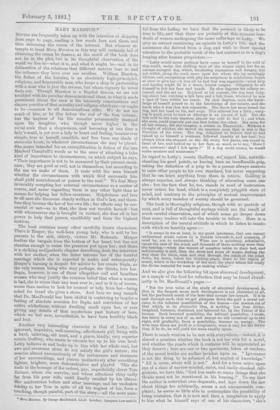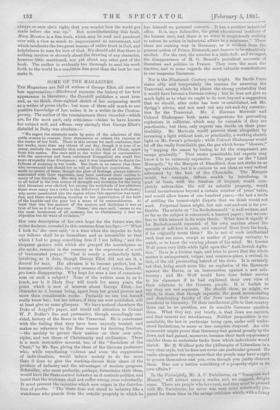MARY MARSTON.*
NOVELS are frequently taken up with the intention of skipping from page to page, reading a few words hero and there, and thus skimming the cream of the interest. But whoever at- tempts to treat Mary Marston in this way will certainly fail of obtaining the cream he desires, as the merit of the book does not lie in the plot, but in its thoughtful observation of the world we live in—what it is, and what it might be—and in its delineation of the relations that different natures bear to and the influence they have over one another. William Marston, the father of the heroine, is an absolutely high-principled, religious, and honourable man, who keeps a shop in partnership with a man who is just the reverse, but whose roguery he never finds out. Though Marston is a Baptist deacon, we are not troubled with his peculiar denominational ideas, as what is made prominent about the man is his intensely conscientious and sincere practice of that morality and religion which are—or ought to be—common to all denominations alike. We do not see much of him, as he dies before the end of the first volume ; but the impress of his life remains permanently stamped upon his daughter, who, though never higher in the social scale than a shopwomau, and becoming at one time a lady's-maid, is yet ever a lady in heart and feeling, because ever simple, true to herself, unselfish, and free from any shade of onauvaise honte, in whatever circumstances she may be placed.
She seems intended for an exemplification in fiction of the late Macleod Campbell's words as to the error of attaching a false kind of importance to circumstances, on which subject he says, "Their importance is not to be measured by their present sweet- ness ; they are good or evil, not in themselves, but according to the use we make of them. It rests with the man himself whether the circumstances with which God surrounds him shall yield nourishment or poison to the soul." We find Mary invariably accepting her external circumstances as a matter of course, and never regarding them in any other light than as means for helping her fellow-creatures. Helpfulness and love to all men she discovers clearly written in God's law, and there- fore they become the law of her own life ; her efforts may be suc- cessful or not--as to that, she does not trouble herself—but with whomsoever she is brought in contact, she does all in her power to help that person, unselfishly and from the highest motives.
The book contains many other carefully drawn characters. Thera is Helper, the well-born young lady, who is sold by her parents to the rich, elderly, vicious Mr. Redmain. Helper loathes the bargain from the bottom of her heart, but has not stamina enough to resist the pressure put upon her ; and there is a striking andipathetic chapter describing, first, the interview with her mother, when the latter informs her of the hateful marriage which she is expected to make, and subsequently 'Jasper's turning in despair for advice to her cousin Sepia, as the only human being who may perhaps, she thinks, love her. Sepia, however, is one of those altogether evil and heartless women who may justify the common belief that when a woman is bad, she is worse than any man ever is ; and so it is, of course, worse than useless to look for counsel or help from her—being asked for bread she gives a stone. And here we may remark that Dr. MacDonald has been skilful in contriving to inspire a feeling of absolute aversion for Sepia, and conviction of her entire wickedness, without dwelling much upon her, or ever giving any details of that mysterious past history of hers, which we feel sure, nevertheless, to have been horribly black and foul.
Another very interesting character is that of Letty, the ignorant, impulsive, well-meaning, affectionate girl, living with a hard, unloving, old aunt, and a grave, kindly, very superior cousin Godfrey, who wants to educate her up to his own level. Letty believes in and looks up to him with her whole soul, but awe and reverence alone do not satisfy the girl's nature; she wearies almost unconsciously of the seriousness and sternness of her surroundings, and yearns instinctively after something lighter, brighter, more demonstrative and playful. This she finds in the homage of the ardent, gay, superficially clever Toni Helmer, whom she marries, and whose affections stray sadly far from his poor wife, until finally recalled by his illness. Her misfortunes before and after marriage, and her unshaken fidelity to her Tom in spite of all his neglect of her, form a touching, though painful, part of the story,—all the more pain- • Mare Maraca, By George MacDonald, LLD, London ; Sampson Low and 00. ful from the feeling we have that the portrait is likely to be true to life, and that there are probably at this moment hun- dreds of women undergoing the same sufferings as Letty. We give an extract containing an episode in Lotty's life, and the assistance she derived from a dog, and wish to draw special attention to the probable truth of the last sentence as to a dog's longing after human proprietors :— " Letty would never perhaps have come to herself in the cold of this world, under the shifting tent of the winter night, but for an outcast mongrel dog, which, wandering masterless and hungry, but not selfish, along the road, came upon her where she lay seemingly lifeless, and, recognising with pity his neighbour in misfortune, began at once to give her—it was all he had that was separable—what help, and healing might lie in a warm, honest tongue. Diligently he set himself to lick her face and hands. By slow degrees her misery re- turned, and she sat up. Rejoiced at his success, the dog kept dodg- ing about her, catching a lick hero and a lick there, wherever he saw- n spot of bare within his reach. By slow degrees, next, the know- ledge of herself joined on to the knowledge of her misery, and she know who it was that was miserable. She threw her arms round the dog, laid her head ou his, and wept. This relieved her a little ; weep- ing is good, even to such as Alberigo in an ice-pot of boll. But the was cold to the very marrow, almost too cold to feel it ; and when she rose, could scarcely put one foot before the other. Not once, for all her misery, did she imagine a return to Thornwiek. Without a thought of whither, she moved on, unaware oven that it was in the direction of the town. The dog, delighted to believe that ho had raised up to himself a mistress, followed humbly at her heel ; but always when she stopped, as she did every few paces, ran round in front of her, and looked up in her face, as much as to say, Here I am, mistress ! shall I lick again ?' If a dog could create, he would) make masters and mistresses."
In regard to Letty's cousin Godfrey, we: regard him, notwitha standing his good points, as having been an insufferable prig, taking the definition of a prig to be a person always anxious to raise other people to his own standard, but never supposing that he can learn anything from them in return. Godfrey is always superior, and always thinking of educating some one else ; but the fact that he, too, stands in need of instruction never enters his head, which is a completely priggish state of mind, and contrary to the principles of mutual improvement by which every member of society should be governed.
The book is thoroughly religious, though with no particle of cant, and is full of thoughtful sayings which are the result of much careful observation, and of which some go deeper down than many readers will take the trouble to follow. Here is a description of the mental attitude in which to listen to musics with which we heartily agree :— " It seems to me at least, in my groat ignorance, that one cannot
understand music unless he is humble towards it, and consents, if need be, not to understand. When one is quiescent, submissive,. opens the ears of the mind, and demands of them nothing more than the hearing,—when the waters of question retire to their bed, and individuality is still, then the dews and rains of music, finding the way clear for them, soak and sink through the sands of the mind down, far down, below the thinking-place, down to the region of music, which is the workshop of the soul, the place where lies ready the divine material for man to go making withal."
And we also give the following bit upon abnormal development,. as a sample of the food for reflection that may be found abund- antly in Dr. MacDonald's pages :- " But the true value of the study of abnormal development is,. that, in the deepest sense such development is not abnormal at all,. but the perfected result of the laws that avenge law-breach. It is In and through such, that we get glimpses down the gulf a moral vol- cano, to the infernal possibilities of the human—the lawless rot, of that which, in its attainable idea, is nothing less than divine,. imagined, foreseen, cherished, and laboured for, by the Father of the human. Such inverted possibility, the infernal possibility, I mean,. lies latent in every one of us, and except wo stir ourselves up to the right, will gradually, from a possibility, become an energy. The wise man dares not yield to a temptation, were it only for the terror that, if he do, ho will yield tho more readily again.
There is much wisdom to be met with everywhere,—indeed, it in almost a question whether the book is not too wise for a novel,. and whether the pearls which it contains will be appreciated as they deserve ; here are one or two specimens, taken at random, of the moral truths our author lavishes upon us. " Ignorance is not the thing to be ashamed of, but neglect of knowledge." " All is scum, where will is not." And for a terse satire upon one of a class of narrow-minded, strict, and easily-shocked reli- gionists, wo have this, " God has made so many things that she thinks must not be mentioned in his hearing !" To say that the author is somewhat over-dogmatic, and lays down the law about things too arbitrarily, seems a not unreasonable com- plaint; he seems so little able to contemplate the possibility of being mistaken, that it is now and then a temptation to apply to him what he himself says of one of his characters, " she's always so sure she's right, that you wonder how the world got made before she was up." But notwithstanding this fault, Mary Marston is a fine work, whiCh may be read and pondered over with a view as much to improvement as amusement, and which inculcates the two great lessons of entire trust in God, and helpfulness to man for love of God. We should add that there is nothing careless or slovenly about the drawing of any character, however little mentioned, nor yet about any other part of the book. The author is evidently too thorough to send his work forth to the world in a condition less good than the best he can make it.



































 Previous page
Previous page